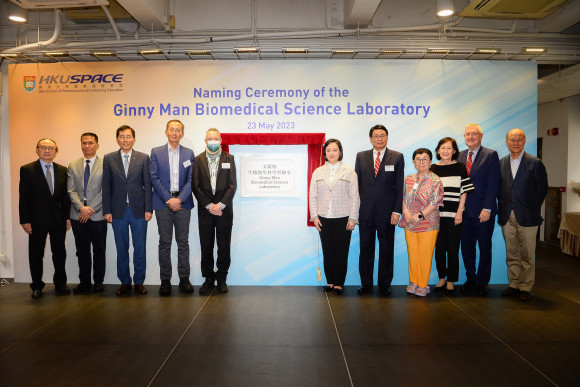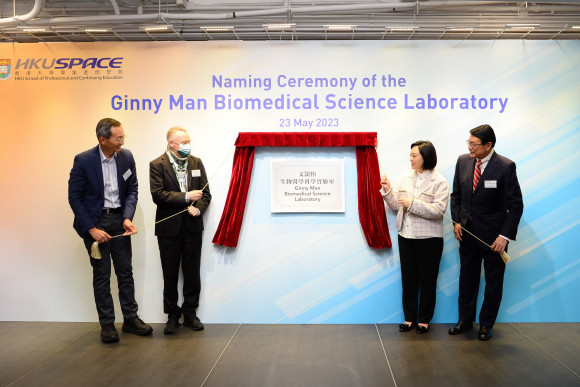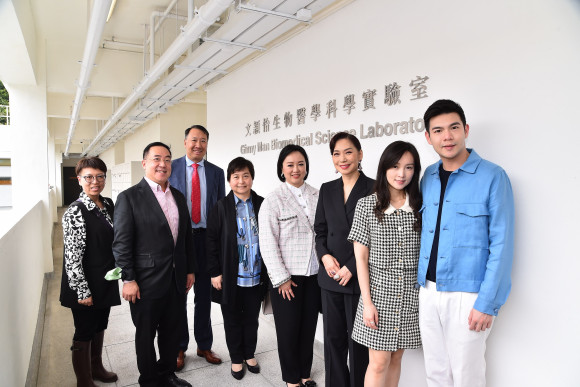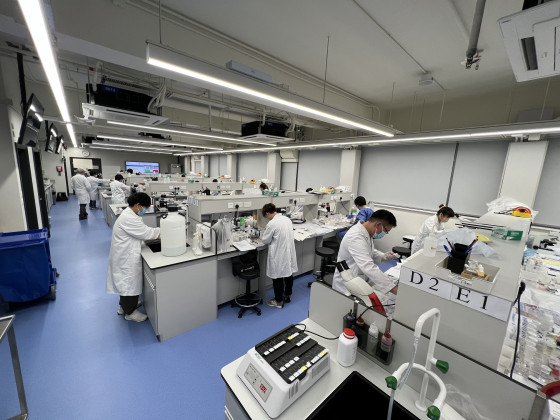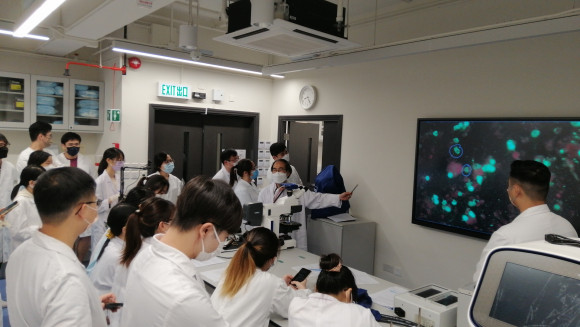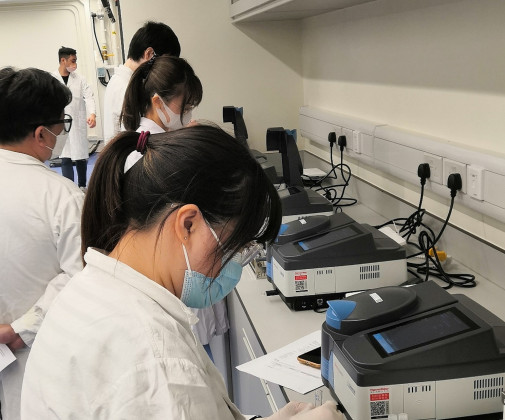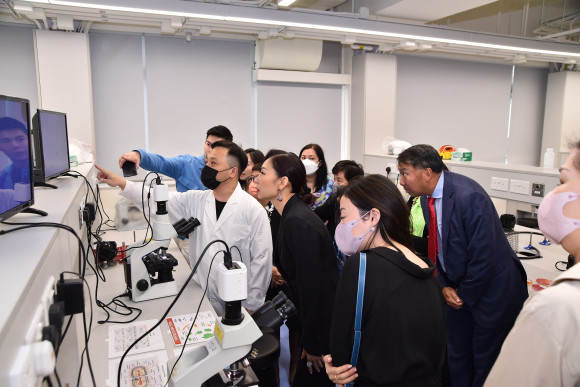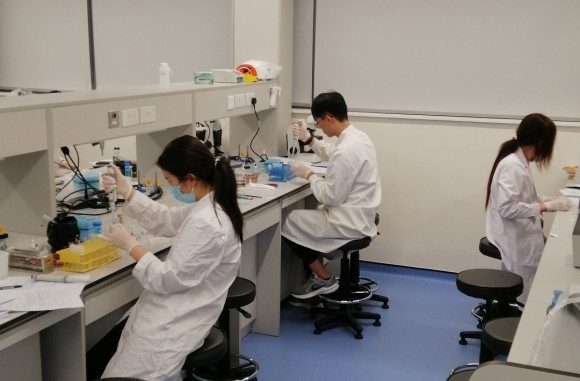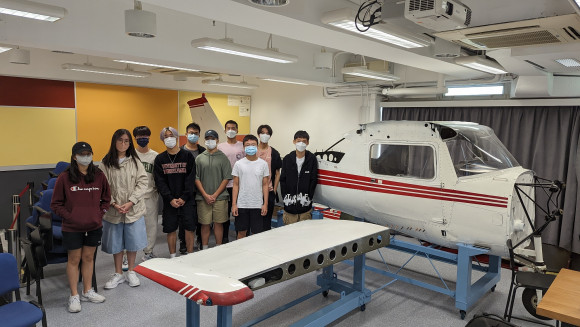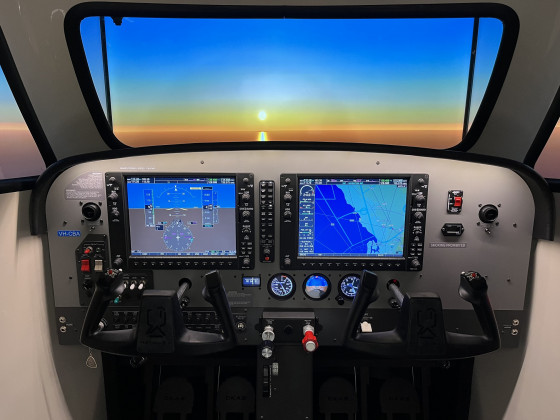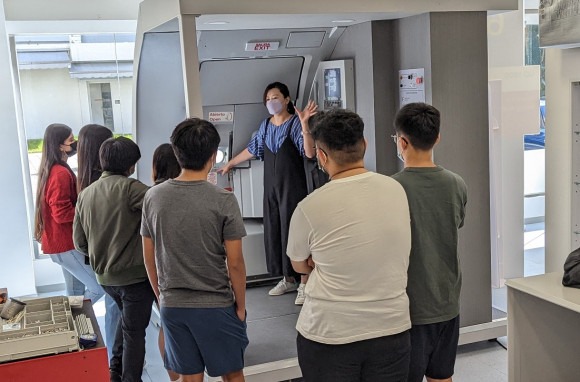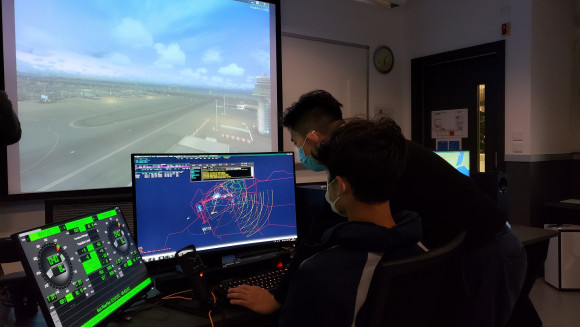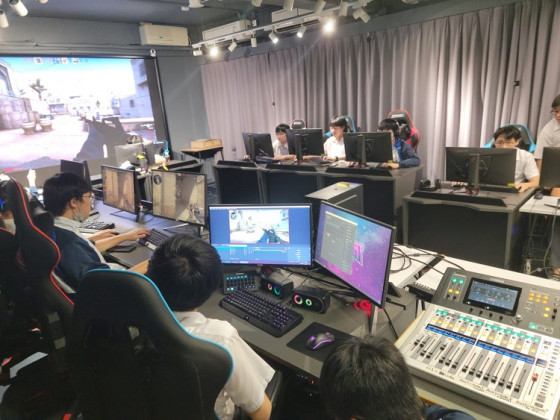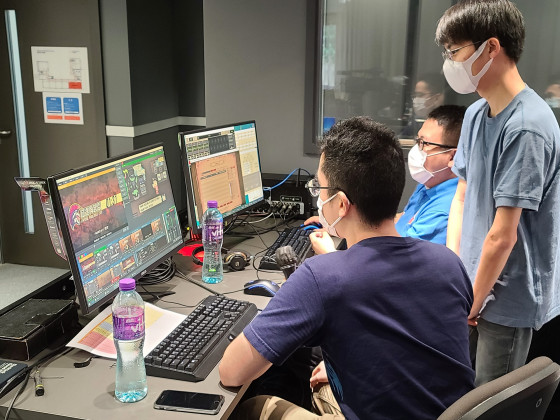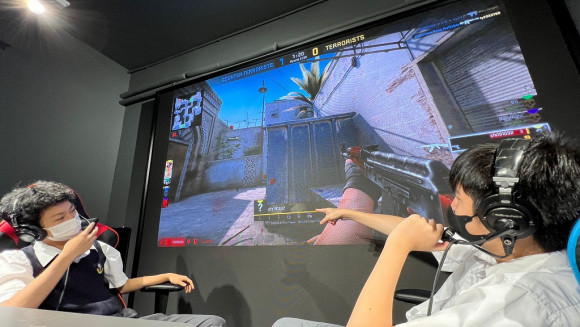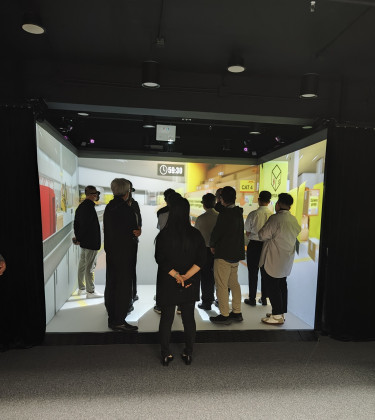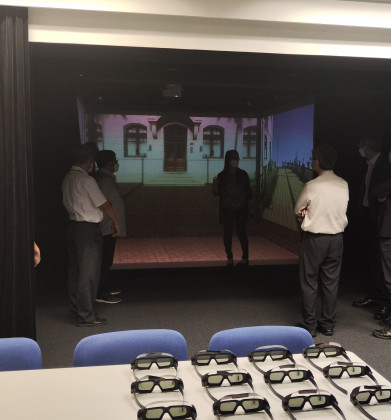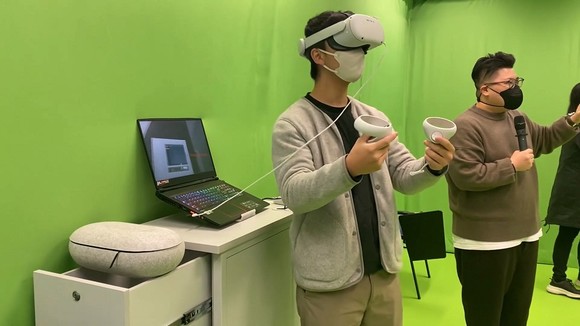Life at HKU SPACE Our Stories
Island South Innovation Hub’s Laboratory namedFeature Story
- Date
- 04 Aug 2023 (Fri)
HKU SPACE is committed to innovative teaching and learning, and has been investing in e-learning to enhance students’ learning experiences. In 2021/22, it invested in transforming its Island South Pokfulam campus into a techonology hub called "TechnoSPACE," to support disciplines such as aviation, e-sports, geotechnical engineering, and biomedical science. The school is also very grateful for Ms Ginny Man's generous support of biomedical education and has named the biomedical science laboratory after her.
Naming Ceremony of the Ginny Man Biomedical Science Laboratory
To honour the generosity and support for the biomedical education given by Ms Ginny Man, the School named the biomedical science laboratory after her as the “Ginny Man Biomedical Science Laboratory” at a ceremony held on 23 May 2023.
Officiating alongside Ms Man were Professor Ian Holliday, Chairman of the Board of Directors of HKU SPACE; Professor William K.M. Lee, Director of HKU SPACE, and Professor William Leung, Chairman of the HKU SPACE Foundation.
At the ceremony, Professor Leung expressed his heartfelt gratitude to Ms Man for her staunch support of the School and the students. Ms Man hoped the laboratory would become a vibrant centre of research and education, nurture more biomedical science talent in Hong Kong and make a significant impact in the years to come.
The 320-square-meter Biomedical Science Laboratory is equipped with state-of-the-art biotechnology training facilities, including a Sanger sequencer and a next-generation sequencer for sequencing DNA to study genetic variations associated with diseases or other biological phenomena, a microtome to slice tissues for laboratory testing, real-time PCR instruments, fluorescent microscope, blood testing system with column agglutination technology, CO2 incubators, an ultra-low temperature (ULT) freezer, ultrapure water system, and a variety of routine biomedical instruments and devices (e.g. centrifuge, spectrophotometer, and etc.).
The laboratory provides teaching facilities covering all four major sections of medical laboratory science including clinical chemistry, haematology and serology, histopathology and cytology, and medical microbiology. The facilities can also be used for molecular diagnostic tests such as in oncology, microbiology, and prenatal tests. The laboratory is also equipped with an interactive digital whiteboard that allows students to view biological specimens under the microscope, enhancing interaction with the instructor and making it an ideal classroom for professional education in biomedical sciences from introductory level to master’s degrees. In fact, the Higher Certificate in Medical Laboratory Science is the only part-time programme in Hong Kong that enables students to register as Medical Laboratory Technologists under Cap. 359 Supplementary Medical Professions Ordinance (SMPO).
The Island South Campus also houses other unique facilities, which are designed to enhance digital learning experiences and applications of technologies in teaching and learning.
|
5/F |
Ginny Man Biomedical Science Laboratory (501-6) |
|
4/F |
Multi-purpose Information Technology Laboratory (402)
Computer Laboratories (403 & 404) |
|
3/F |
Geotechnical Laboratory (301-303)
VR Laboratory (304)
CAVE Laboratory (305) |
|
2/F |
Aircraft Maintenance Laboratory (205)
|
|
1/F |
Collaborative Learning Area for Aviation (104)
eSports Mock-up Stadium (105) |
|
G/F |
Aircraft Mock-up Cabin & Flight Simulator Lab (G7-8) |
Aviation classrooms offer authentic flight operation training
Technological advancements have revolutionised traditional teaching methods. In light of this, TechnoSPACE located in the Island South Campus is equipped with the most advanced devices and laboratories in order to improve and enhance teaching and learning experiences.
Special classrooms for aviation studies include the Aircraft Mock-up Cabin & Flight Simulator Lab with a six degrees of freedom (6DOF) full-motion base flight simulator that offers a realistic flight training environment; an Airbus 320 door trainer for students to practice emergency escape procedures; an Aircraft Maintenance Laboratory that displays Cessna C152, a single-engine small commercial aircraft with its blades and other aircraft components. There is also a Collaborative Learning Area for Aviation with air traffic control simulation training facilities.
Gearing up for e-Sports
The eSports Mock-up Stadium was established to complement the e-Sports programmes of the School. The Stadium is equipped with ten units of gaming desktop computers, along with accessories like the ROG Strix 270Hz high-resolution monitor, Razer mouse and keyboard and gaming headphones. They all rest on a tailor-made mobilized gaming desk, allowing teachers and students to set the Stadium for different uses. A 6.3 sqm high-resolution LED wall is linked to a high-power production desktop computer with a dual monitor in a soundproof control room capable of composing and live streaming footage from the gaming computers. All computers in the Stadium are linked to an independent 5G WiFi network.
Students of the e-Sports programmes will gain insights and technical expertise on different aspects revolving around e-Sports, ranging from the production of e-Sports competitions, event coordination and management, to anchoring script, editing, monitoring broadcasts and even related health issues. Courses of Higher Diploma, Diploma as well as Certificate (Senior Secondary Applied Learning) in e-Sports will take place in this mock-up arena.
Experience the real world in VR Laboratory
Since 2016, the School has been implementing VR applications in different courses to enhance students’ learning experiences.
VR replicates the physical world through digital devices, allowing students to experience the environment with an immersive 360-degree perspective. This advanced technology can be applied in various disciplines such as aviation, food and nutritional science, marketing and nursing. For example, students of the aviation programmes can learn to handle different emergency cases during the flight as if in a ‘real’ situation.
Cave Automatic Virtual Environment (CAVE) allows students from different disciplines to learn and explore the world in an interactive way. For architecture and interior design students, CAVE technology allows them to project their designs into a three-dimenisional space, they can walk through it with teachers and classmates, and get teachers’ feedback ‘on-site’, which is hugely beneficial to their learning.


